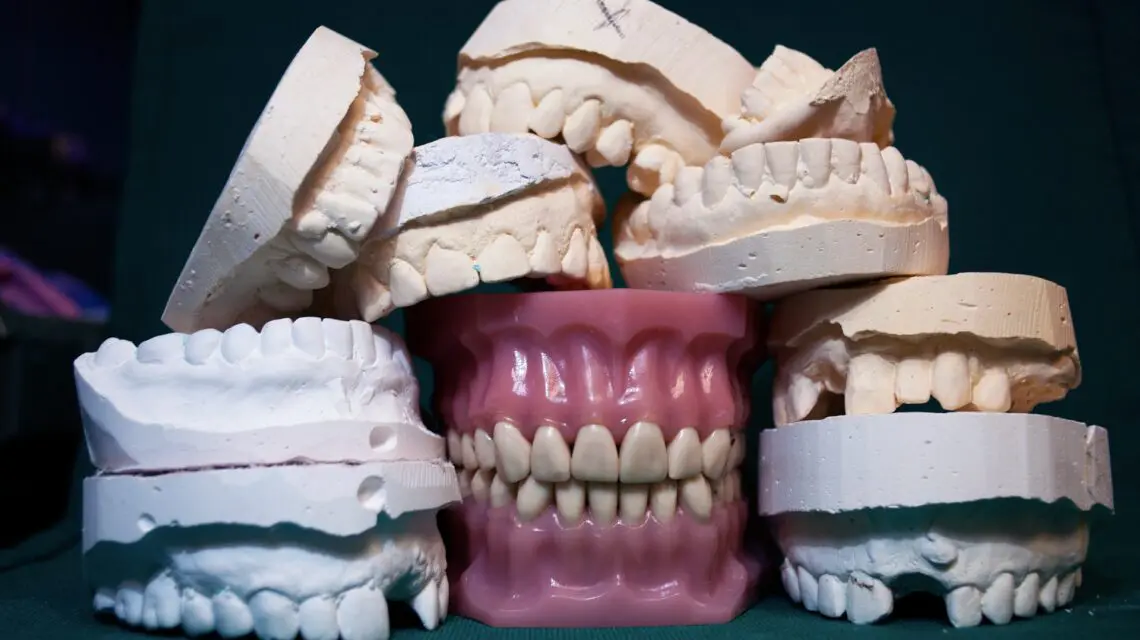Dentures are a wonderful tooth replacement option, but for most people, they can take some getting used to. You’ll see some benefits right away—like your dazzling new smile—but other things, like learning to speak clearly or adjusting to a new diet might take some time. We explain everything you need to know about how to get used to wearing dentures, so you can feel more confident and comfortable.
Finding Your New Normal
Getting used to dentures is all about practice. After several weeks, they should fit seamlessly into your life. In the meantime, practicing speaking out loud and doing a few facial exercises can help speed up the process.
Practice Speaking Aloud
Our favorite way to practice fluency with dentures is to read aloud. This can help your mouth relearn the placement for certain sounds and reduce the lisp you might have noticed when you first spoke with your dentures. We also like to practice in front of a mirror, but that is only to admire our new look while we practice.
Daily Facial Exercises
Facial exercises help improve blood flow and strengthen the muscles of the face to keep it from looking sunken in. One exercise that you can do is for your cheek muscles. Make an extremely wide smile and then wiggle your nose—doing this for 10 seconds several times a day will keep your face in tip-top shape.
Changing Your Diet
It always takes some time to get used to what you can eat with dentures. Because they can come loose, there are some foods you’ll need to avoid. Here are a few tips for changing your diet.
Start with Soft Foods
Dentures take some getting used to, so eating softer foods is a good place to start when you’re new to wearing dentures. Stick to things like blended soups, mashed potatoes, scrambled eggs, and oatmeal until your mouth is used to the dentures.
Harmful Foods for Dentures
Some foods can be harmful to your dentures. Things like coffee and red wine can cause stains, which is why cleaning your dentures is so important for their longevity. You should also avoid sticky foods like dried fruit and hard foods like nuts.
Dealing with Discomfort
While dentures can be uncomfortable at first, they should never be so uncomfortable that you are unable to go about your day. Let your dentist know if your dentures are painful or if they are damaging the soft tissues of your mouth.
Use a Saltwater Rinse to Clean Your Mouth
Swishing with a saltwater rinse will relieve any swelling and help prevent infections. Just add ½ teaspoon of sea salt to 1 cup of warm water to make a salt rinse. Swelling is often a common part of getting used to dentures, however, if you’re getting sores on your gums, your dentures probably don’t fit correctly. If they are causing you pain, see your dentist to get them adjusted.
Use Over-the-Counter Medicines for Discomfort
After you first get your dentures, your dentist will most likely recommend some over-the-counter (OTC) medicines to help you alleviate minor discomfort. OTC pain medicines should only be used as directed, and only for short amounts of time. If your dentures are still uncomfortable after you’ve been wearing them for several weeks, you should see your dentist.
Denture Care Available in Flagstaff Arizona
If you are interested in getting dentures or you need a new set, contact the experts at Country Club Dental. Our amazing dentists, Dr. Paul Whitney is here to help you get the most out of your dentures. We can replace damaged or worn-out dentures, or fit you for your very first set! Contact us today to schedule an appointment.
Images used under creative commons license – commercial use (11/22/24). Photo by Chiara Guercio on Unsplash.


